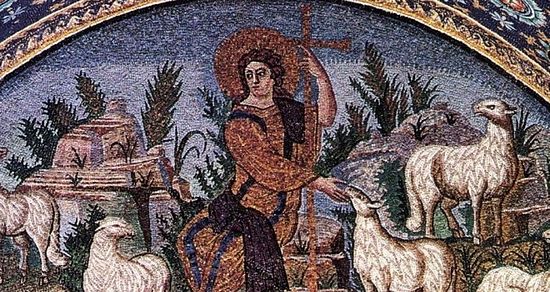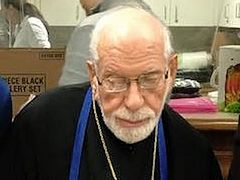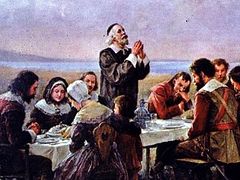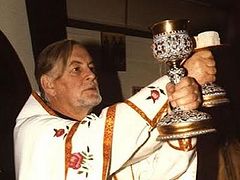The audio of this Thanksgiving homily can be found on the site of St. Nicholas Russian Orthodox Church in McKinney, TX.
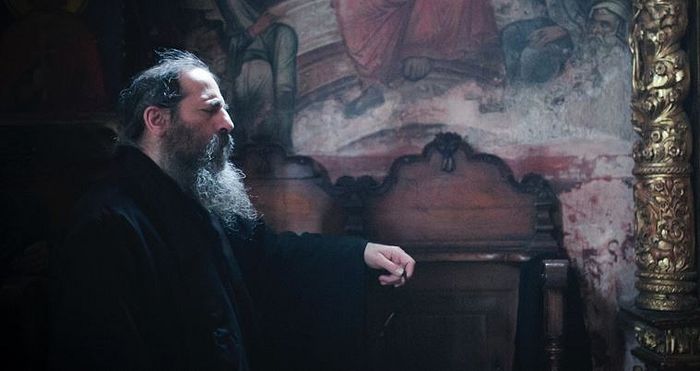 Photo: http://journeytoorthodoxy.com/2014/07/why-would-a-protestant-convert-to-eastern-orthodox-christianity/
Photo: http://journeytoorthodoxy.com/2014/07/why-would-a-protestant-convert-to-eastern-orthodox-christianity/
In the name of the Father and of the Son and of the Holy Spirit. Amen.
Today we are celebrating the Eucharist, thanksgiving, on the American holiday of Thanksgiving. We have a custom at our Thanksgiving dinner of saying three things we are thankful for. The first thing I thought about was that we should recognize that many of our brethren are being tortured, harried, chased; they’re naked, cold, hungry, they’re orphans, widows, and widowers because of this outburst of evil, especially in the Middle East. We should always remember our brothers who are hurting. We’re not cold, we’re not hungry, and no one is chasing us. Perhaps someone calls us a name once in a while. If you pay attention, you’ll see that in every service we twice pray for the persecuted and suffering, and we should especially remember them on this day.
There’s a verse from the Psalter that has always made a deep impression on me, which says that our hearts are deep—deep enough to contain God. Not deep because we made them deep but because He made them deep, and our hearts are made to be filled with God. That’s what I’m most thankful for—that my heart is deep and your heart is deep. There are hearts that won’t be filled, that focus on shallow things, and that’s truly sad, but God made us so that we could know Him intimately. We have no part with Him at all: we’re mortal, temporal, full of sin, devious, capricious, weak-minded, weak-willed—none of the things that God is, and yet He will call us sons and daughters, and that is what I’m most thankful for. Every day I more distinctly feel my own weakness, my own differentness from God, and yet God is calling me to be with Him, and to in some way be the same as Him. Scripture says ye are gods—we’re called to create, to minister to, to give compassion and love—all the things that God does, and this is what I’m thankful for.
I’m getting to be an old man. I think differently than I used to—there’s a little more focus. I’m glad for all the good and all that bad that happens, because I just want to be useful to God, because of what He’s done for me. I’m most thankful that, despite being nothing like Him, He is calling me to Himself, in a somewhat slow and torturous process, but one that I’m very grateful for.
The Scripture for St. John Chrysostom today,[1] who said “glory to God for all things” as he was dying in some cold, mountainous region in Turkey, sick, feverish, coughing, and probably unable to walk, is that for a hierarch, which is about a shepherd. There are two things in this reading that have always struck me. It talks about the sheep going in an out and finding pasture—it’s about freedom—the freedom of the soul to be perfectly good. You and I are not free like that yet. We can try to be good, but some bad always ends up happening, or even when we try to do good it’s a struggle. But this perfect freedom of going in and out and finding pasture is the image of salvation, and I’m very glad for that. There are times in my life that I feel perfectly free to do something good, and when that happens there’s a feeling of light in me. I’m not a holy man, I’m a sinful man, and so these feelings of light are short-lived, but they’re a harbinger of things to come. I’m thankful that someday I’ll be totally free. I think that’s why I became a priest—I was captivated by this idea of personal freedom. I just wanted to tell other people about it. I didn’t realize this at the time, but now I can’t imagine anything else.
There have been great losses in my priesthood, but I’m glad for those too. I’m not always emotionally glad for them, but a shepherd lays down his life for the sheep, which means he doesn’t care for his own personal well-being, and of course our Lord is a Shepherd. If we are to become like Him, we must also do that. When we humble ourselves when we help someone out, when we sacrifice of ourselves for others then we become a little bit like the Shepherd, and thankful that He accepts our puny ministrations. I’m speaking now not as a priest but just as a human being, a Christian, offering my puny ministrations, trying to be like a little shepherd. I’m thankful for that very much.
In this reading there is freedom, and also suffering, just as in life, and those who are truly free will suffer. Those who are not free will also suffer but they won’t understand why they’re suffering. We’re Christians, and we should know why we suffer. The heart is deep, the heart is like God, and the heart contains God. The heart contains the uncontainable. Even the pain that we feel about the evil in the world, about the difficulty of people’s circumstances, their sin, their anger, is because our heart contains God. That pain that you feel means you’re alive. It’ll mess you up sometimes, but don’t be afraid of it—that’s part of having a deep heart. I’m most thankful that my heart and your heart are deep, to be filled with God. If I could get the junk out of it then I could be completely filled with God, and that process is occurring little by little, that someday we might be completely free. I long for that day. Someday we’ll be free, to never be bad, to never have any thoughts that tear at us and hurt us, to never have regrets.
We had a big discussion about regrets at the prison yesterday. One man said that in Heaven there won’t be punishments, but we’ll be aware of what we missed because of the way we lived. Heaven has many mansions and some will be closer to God than others and we’ll be aware of that. I believe the great ones, like St. John Chrysostom, will be very close to the throne of God. Sinful ones like me will be able to see God and we’ll be happy. But since we eternally grow closer to God, we have a long time to come to know God. I don’t believe at all that there will be regret in the next world, of any kind, and I’m happy about that, because regret is one of the hardest things to deal with in life, in my opinion.
I hope that when you’re thinking about what you’re thankful for on this day it’s not different than any other day, because despite the fact that you are just a pitiful weak creature, God has called you to be a son and a daughter, and that you have a deep heart and that God is going to fill that heart with Himself. You will become all light, all fire, and all good. We should thank God for that every day. May God bless you and help you in all things.

